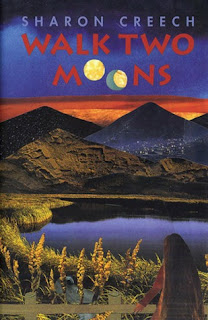Walk Two Moons
Walk Two Moons, by Sharon Creech, is a staple of middle-school English classes. My class is reading it now, and it's my first time reading it. There are some parts I loved, and some parts I loathed.
The story is narrated by Salamanca Tree Hiddle (I usually hate precious names, and this pushes it to the edge), who grew up in an idyllic setting on a farm in Kentucky. Her mother leaves, though, and her father moves them to the suburbs of Ohio. She meets a strange girl, Phoebe, and has a kind of adventure with her. All of this is told in the form of a flashback that she relates to her grandparents on a long drive to Idaho to visit her mother.
What's good about Walk Two Moons is the emotional resonance. Sal, as she is known, learns some good lessons along the way, particularly how one should not blame one's self for something they are not responsible for. Also, there is much in here about not judging first appearances, and how listening to someone else, or "walking two moons in their moccasins," can go a long way to avoiding misunderstandings.
There is also some wonderful literary technique here, particularly in the use of foreshadowing. I was reading along with the kids, and I finally had to take the book home and find out a few things, such as who is leaving mysterious messages on Phoebe's doorstep, who is the "nervous young man" whom Phoebe calls a lunatic, and what does he have to do with Phoebe's mother, and just what will happen when Sal is reunited with her mother. There are some good twists along the way, and Creech withholds some critical information in some nifty legerdemain.
But, Creech is not particularly good in some areas, especially dialogue and characterization. Phoebe is a holy mess, obnoxious and without any redeeming qualities. Why Sal likes her is a mystery, especially when Sal says she could strangle here (a dinner in which Phoebe refuses all food because of cholesterol might be funnier if it weren't indicative of Phoebe's character). I was also annoyed by the grandparents, who act mostly like children, saying things like "Gol-dang." They didn't ring true at all.
The book was published in 1994, so at the time there were no cell phones, but the book seems to be set even further back in time. None of the kids mention video games or any other thing that kids would be obsessed with. It could have been set in the '50s for all I know.
Walk Two Moons might be more effective with teens--most of my students seem to be enjoying it--but it doesn't translate as well for adults.
The story is narrated by Salamanca Tree Hiddle (I usually hate precious names, and this pushes it to the edge), who grew up in an idyllic setting on a farm in Kentucky. Her mother leaves, though, and her father moves them to the suburbs of Ohio. She meets a strange girl, Phoebe, and has a kind of adventure with her. All of this is told in the form of a flashback that she relates to her grandparents on a long drive to Idaho to visit her mother.
What's good about Walk Two Moons is the emotional resonance. Sal, as she is known, learns some good lessons along the way, particularly how one should not blame one's self for something they are not responsible for. Also, there is much in here about not judging first appearances, and how listening to someone else, or "walking two moons in their moccasins," can go a long way to avoiding misunderstandings.
There is also some wonderful literary technique here, particularly in the use of foreshadowing. I was reading along with the kids, and I finally had to take the book home and find out a few things, such as who is leaving mysterious messages on Phoebe's doorstep, who is the "nervous young man" whom Phoebe calls a lunatic, and what does he have to do with Phoebe's mother, and just what will happen when Sal is reunited with her mother. There are some good twists along the way, and Creech withholds some critical information in some nifty legerdemain.
But, Creech is not particularly good in some areas, especially dialogue and characterization. Phoebe is a holy mess, obnoxious and without any redeeming qualities. Why Sal likes her is a mystery, especially when Sal says she could strangle here (a dinner in which Phoebe refuses all food because of cholesterol might be funnier if it weren't indicative of Phoebe's character). I was also annoyed by the grandparents, who act mostly like children, saying things like "Gol-dang." They didn't ring true at all.
The book was published in 1994, so at the time there were no cell phones, but the book seems to be set even further back in time. None of the kids mention video games or any other thing that kids would be obsessed with. It could have been set in the '50s for all I know.
Walk Two Moons might be more effective with teens--most of my students seem to be enjoying it--but it doesn't translate as well for adults.



Comments
Post a Comment